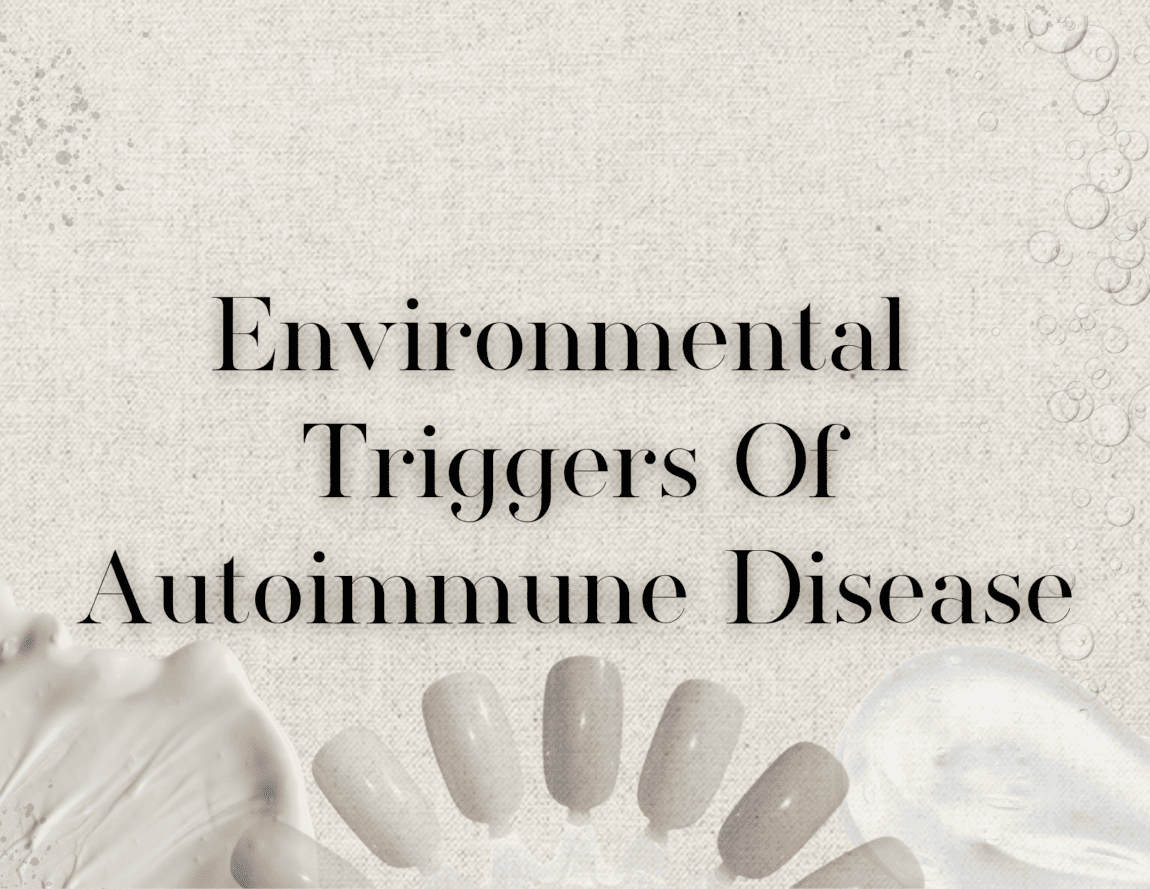
15 Environmental Triggers Of Autoimmune Disease
As some of you may know, I’ve recently been deep-diving into the world of autoimmune diseases. Ever since I was diagnosed with Hashimoto’s, a big part of my life has become learning to deal with the symptoms of my disease.
This means educating myself as much as possible about Hashimoto’s, the most common autoimmune diseases, and what common symptoms to look out for. And, of course, a big part of this process has been sharing everything I learn with you guys in hopes of increasing awareness about the risk factors of these diseases.
“Autoimmune disease” is a term that is used to describe a variety of disorders wherein the body’s immune system attacks its own cells and tissues. Scientists aren’t entirely sure how or why these autoimmune diseases occur. But, research shows that 30% of autoimmune diseases are genetic. While the other 70% come from environmental triggers found in the world around us. And unfortunately, these environmental triggers can be found virtually everywhere.
Some examples of environmental triggers include food, smoking, and exposure to certain metals and chemicals. Being aware of the environmental exposures of autoimmune diseases is the first step to protecting yourself from these diseases. So, today we’re going to discuss some common environmental triggers and how to avoid them.
15 Environmental Triggers Of Autoimmune Disease
Diet
While diet is not directly linked to causing autoimmune diseases, research shows that an unhealthy diet can trigger or exacerbate symptoms of inflammatory autoimmune diseases. This would include Celiac, inflammatory bowel disease, psoriatic arthritis, and Crohn’s disease.
If you have an inflammatory autoimmune disease, consuming gluten, high-fat & high-cholesterol foods, or excess salt can trigger uncomfortable symptoms like swelling, joint pain, upset stomach, diarrhea, and ulcers.
Fortunately, switching to a healthy, gluten-free diet can help reduce symptoms and flare-ups. And the best part is, there are plenty of gluten-free recipes right at your fingertips. Like this Zesty Gluten Free Pasta Salad.
Smoking
Chronic smoke inhalation has many negative effects on your immune system and the way it functions. Cigarette smoking, including secondhand smoke, has been directly linked to the development of some common autoimmune diseases. These diseases include rheumatoid arthritis, systemic lupus erythematosus (lupus), multiple sclerosis, and Grave’s disease.
The best way to avoid this environmental trigger is to avoid smoking cigarettes and inhaling secondhand smoke. It’s also a good idea to avoid breathing in too much campfire smoke. Plus remember to get some fresh air if you’re nearby a smokey area.
Mercury
You produce “autoantibodies” when the body’s immune system begins to attack its own healthy cells. Now, normally, the body would not produce a high amount of these. But, according to this research, exposure to high levels of mercury has been proven to increase the body’s production of autoantibodies. Thus increasing the risk of autoimmune diseases.
Mercury is linked to the development of inflammatory bowel disease, lupus, Sjögren’s syndrome, rheumatoid arthritis, and multiple sclerosis. This metal finds its way into our bodies when we consume low-quality seafood. Plus when we breathe in fumes from coal combustion and waste incineration. The best way to avoid consuming mercury is by eating only high-quality fish like salmon and tuna. You can also wear a mask on low-air-quality days.
Bacterial Infections
Research shows that some bacterial infections are linked to the development of rheumatoid arthritis. It’s an autoimmune disease that causes joint pain, joint tenderness, and, in some cases, permanent deformity.
Bacterial infections to look out for are Escherichia coli, Klebsiella pneumonia, and Proteus mirabilis. These particular bacterial infections come from unclean meat & vegetables and infected water. The best way to avoid these bacterial infections is to make sure your groceries and water are fresh, clean, and bought from reputable sources.
Viral Infections
Viral infections have been linked to the development of varying autoimmune diseases is linked to viral. Especially in the case of multiple sclerosis (MS). Viral infections weaken, and even damage, the immune system. This can lead to improper functioning and autoimmunity.
You can avoid viral infections by washing your hands often and thoroughly. Avoid sick friends and colleagues, and stay home when you feel under the weather.
Parasitic Infection
I know, talking about parasites is awful, but unfortunately, we can’t afford to leave them off our list. Parasitic infections are more common than you think. Research shows that they are directly linked to the development of systemic lupus erythematosus and varying inflammatory autoimmune diseases.
Common parasites include tapeworms, roundworms, and pinworms. These parasites usually transmit through food or water. Usually, with good hygiene and safe cooking practices, you can avoid these parasites easily. Just remember to drink clean water, wash your hands often, and cook all meat to recommended temperatures. It’s also a good idea, especially if you’re pregnant, to avoid cat litter and feces.
Silicone Implants
While there is limited research on whether silicone implants actually cause autoimmune disorders, research does show a connection between silicone implants and autoimmunity. Silicone implants can trigger immune responses that cause chronic inflammation and improper functioning of the immune system. This, in turn, can lead to autoimmunity and/or a full-on autoimmune disease. Of course, the best way to avoid this environmental trigger is to avoid implanting any type of silicone into the body.
Pesticides
According to research, farming, agricultural, and residential pesticides have been directly linked to the development of lupus and rheumatoid arthritis. The chemicals found in these pesticides can wreak havoc on the immune system as well as the respiratory and cardiovascular systems. You can avoid these pesticides by thoroughly washing all fruits and vegetables. Buy organic, and refuse pesticide services in and around your home.
Silica Dust
According to the Center for Disease Control and Prevention (CDC), there are many health risks associated with silica dust. Exposure to silica dust for more than ten years can lead to silicosis. Which is a disease that puts victims at a much higher risk for developing some autoimmune diseases. For example, chronic exposure to silica dust increases the risk of rheumatoid arthritis, systemic lupus erythematosus, and systemic sclerosis (scleroderma).
In most cases, you don’t have to worry about overexposure to silica dust. But, there are some jobs and trades where exposure to silica dust is a real issue. These jobs include construction, mining, oil and gas extraction, stone countertop manufacturing, foundries, and, in some cases, dentistry. The best way to avoid silica dust is to wear a mask when in or around construction or manufacturing sites.
Solvents
Solvents are chemical additives that often appear in our lives. They are in dry cleaning products, paint thinner, nail polish, nail polish remover, glue, spot removers, detergents, and perfumes. And, according to research, they trigger rheumatoid arthritis, systemic lupus erythematosus, and systemic sclerosis. When these solvents enter the body, they trigger autoimmune responses which overwork and damage the immune system. So, let’s break down these solvents and how to avoid them.
Nail Polish and Remover
Some nail polishes and removers contain dangerous solvents that can wreak havoc on the body. These solvents include acetone, methyl acetate, and ethyl acetate. The good news is, there are plenty of safe products out there for your nails! The best way to avoid these solvents is to purchase solvent-free nail polish and acetone-free remover.
Dry Cleaning Products
The dangerous solvent found in dry cleaning products is tetrachloroethylene. This solvent can have adverse effects on your immune system, reproductive system, liver, and more. You can avoid this solvent by using organic dry cleaning products at home or by avoiding the dry cleaner.
Paint Thinner
Painter thinner contains both toluene and turpentine. These solvents are dangerous to the whole body, but especially the immune system. You can avoid these solvents by wearing a protective mask and goggles when using paint thinner. And always washing your hands after contact.
Detergents
Some detergents include citrus terpene, a solvent known to cause immune defects and autoimmunity. To avoid this solvent, be sure to use solvent-free detergent for your dishes and clothes. It’s also a good idea to purchase solvent-free cleaning products for your hard surfaces, windows, and floors.
Perfumes
Different types of perfumes and colognes contain ethanol. Ethanol is a dangerous chemical when ingested and/or inhaled and can cause chronic inflammation. The best way to avoid this solvent is to make sure your favorite body sprays, perfumes, and colognes are solvent-free.
Always be aware of your environment.
As you can see, there are many different and random environmental factors that can expose the body to autoimmune diseases. This is why it is so important to be able to identify and avoid these environmental triggers as much as possible. Being able to avoid these triggers can, at the very least, reduce your autoimmune symptoms. And hopefully, improve your quality of life.
So, to wrap it up, I will leave you with one last piece of advice. ALWAYS be aware of your environment. By being aware of your surroundings and taking measures to ensure your environmental health, you can better protect yourself from these autoimmune diseases and more!
Xx Monti
Shop the Post


